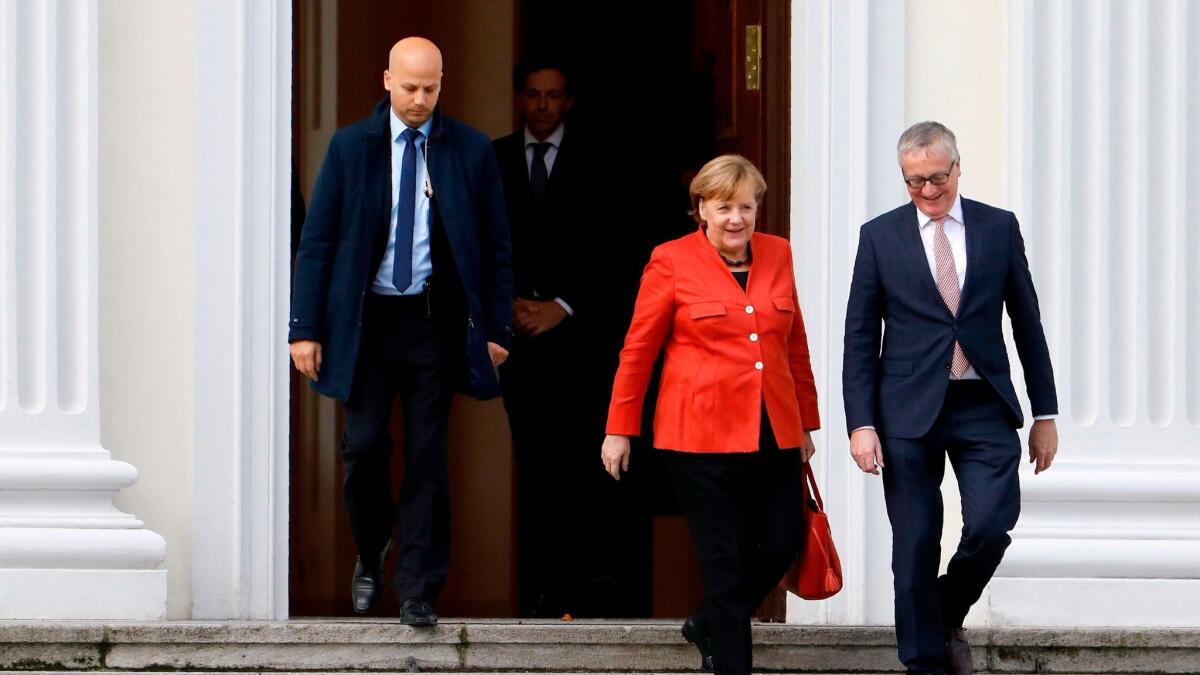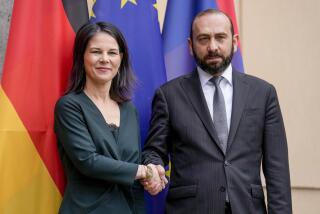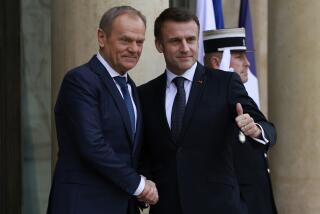Germany faces uncertain political future as talks on new coalition government collapse

German Chancellor Angela Merkel said Monday that she would rather face another election than try to muddle through with a minority government if further negotiations did not yield coalition partners.
Merkel’s comments came after talks to form a new government unexpectedly collapsed late Sunday, eight weeks after the Sept. 24 election that left Merkel’s conservative party with the largest share of voters but far short of a majority in parliament.
One of the parties Merkel was in talks with to form a government, the pro-business Free Democrats (FDP), bailed out of the tense talks.
Faced with the possible end of her run as chancellor, Merkel said it might be possible to cobble together a new government in the days ahead after President Frank-Walter Steinmeier urged the estranged parties to keep trying.
Merkel, who has been the country’s leader since 2005, nevertheless pointedly began referring to herself Monday as a “caretaker chancellor.”
Because political instability in the early 1930s contributed to the rise of Adolf Hitler and the Nazis, Germans have a deeply entrenched fear of political turbulence and a sharp aversion to any kind of a minority government even though they are not uncommon in other countries.
“I don’t have any plans to lead a minority government but we’ll have to wait and see what happens in the days ahead,” Merkel told German television. “One possible path is new elections and another path -- a minority government – is one that we have to be extremely careful about. I don’t want to say ‘never’ but I’m doubtful about that and think the new elections path is the better way to go.”
The September election produced a stalemate when Merkel’s conservative Christian Democrats and their arch conservative Bavarian sister party, the Christian Social Union, failed to win enough for a center-right majority with their preferred FDP partners.
Merkel’s current partners, the badly beaten center-left Social Democrats (SPD), refused to sign on for another four years. Merkel and her conservatives have spent the last two months making overtures and concessions to the pro-ecology and left-leaning Greens but that led to the pro-business FDP abandoning the talks.
The ideological gulf between the Greens, who have helped make Germany one of the world’s leaders in renewable energy, and the conservatives, was already vast but appeared to be suddenly bridgeable during the arduous exploratory talks that were only the precursor for another month or two of full-scale talks. But the gap between the Greens and FDP at least for now turned out to be too large.
“We did not leave a stone unturned in trying to find a solution,” Merkel said, and promised to “do everything possible to ensure that this country is well-governed through these difficult weeks ahead.”
The turmoil in Germany, Europe’s biggest economy, comes at an awkward time for the European Union. The bloc has come to rely on Merkel’s leadership for issues ranging from the euro zone, Britain’s decision to leave the union known as Brexit and the tensions with the United States since President Trump’s election.
In her TV interview Monday evening, Merkel held out hope that there could still be a solution to avert new elections – which would likely be held in early 2018. She said she would wait until Steinmeier had talked to the leaders of the Social Democrats to see if the party that he once ruled could be persuaded to join forces with Merkel after serving as junior partners for the last four years.
After that, Merkel could make another attempt to bring the FDP and Greens together albeit in an awkward coalition.
“The situation has become a lot more difficult for Merkel,” said Gero Neugebauer, a political scientist at Berlin’s Free University. “And it’s going to be really difficult for her if she goes out there and tries to win another election when voters are forced back to the polls just because she wouldn’t accept demands from other parties – not because there was some major reason.”
Kirschbaum is a special correspondent.
UPDATES:
2:25 p.m.: This article was updated with Times reporting.
This article was originally published at 4:55 a.m.
More to Read
Start your day right
Sign up for Essential California for news, features and recommendations from the L.A. Times and beyond in your inbox six days a week.
You may occasionally receive promotional content from the Los Angeles Times.






